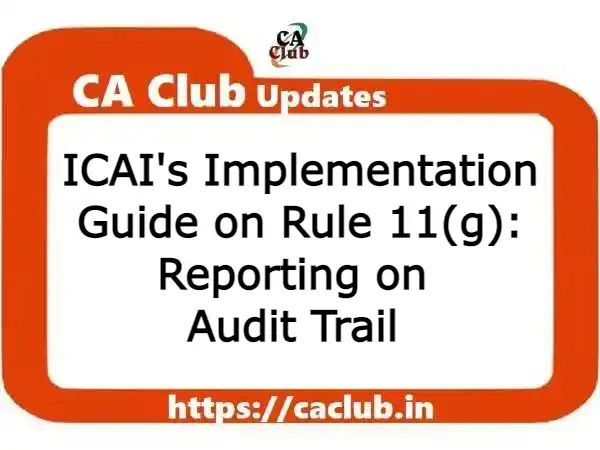The Companies Act, 2013 mandates auditors to report on various matters in their auditor’s report, and Section 143(3)(j) requires them to state any other prescribed matters. Rule 11 of the Companies (Audit and Auditors) Rules, 2014 specifies these additional matters. Recently, the Ministry of Corporate Affairs made changes to Rule 11 with the Companies (Audit and Auditors) Amendment Rules, 2021, including a new reporting requirement (Rule 11(g)) that compels auditors to report on the use of accounting software by companies for bookkeeping with a feature that records an audit trail.
The Companies (Audit and Auditors) Amendment Rules, 2021 introduced new reporting requirements for auditors under Rule 11 of the Companies (Audit and Auditors) Rules, 2014. Among the new rules is Rule 11(g), which mandates auditors to report on the use of accounting software that maintains an audit trail. This new rule is significant as it ensures that the books of accounts maintained by companies are accurate and reliable, and the financial reporting process is more transparent. The rule imposes a challenging responsibility on auditors to comply with the reporting requirement effectively.
To assist auditors in complying with the new reporting requirement, the Auditing and Assurance Standards Board (AASB) of the Institute of Chartered Accountants of India (ICAI) has issued an Implementation Guide. This guide provides comprehensive guidance on various aspects of reporting under Rule 11(g), including the necessary audit procedures to be performed, enabling auditors to discharge their duties more efficiently and effectively. In this article, we will discuss in detail the new reporting requirement under Rule 11(g) and the implementation guide provided by ICAI.
The notification G.S.R. 206(E) dated March 24, 2021 initially made the requirement applicable for the financial year commencing on or after April 1, 2021. However, its applicability was deferred to the financial year commencing on or after April 1, 2022, as per the MCA notification G.S.R. 248(E) dated April 1, 2021. The proviso to Rule 3(1) of the Companies (Accounts) Rules, 2014 has mandated companies to use accounting software with an audit trail feature for maintaining their books of account. Although this requirement was initially applicable from April 1, 2021, its applicability has been deferred twice. Finally, this requirement will be effective from April 1, 2023.
New Reporting Requirement for Auditors on Use of Accounting Software
The Companies Act, 2013 prescribes various matters on which auditors are required to report in their auditor’s report. The Act also states that the auditor’s report shall state such other matters as may be prescribed. Rule 11 of the Companies (Audit and Auditors) Rules, 2014 specifies such other matters that are to be reported by auditors. The Ministry of Corporate Affairs (MCA) issued the Companies (Audit and Auditors) Amendment Rules, 2021 on March 24, 2021, introducing new Rules 11(e), 11(f), and 11(g) in the Companies (Audit and Auditors) Rules, 2014.
New Reporting Requirement under Rule 11(g): Audit Trail
The new Rule 11(g) requires auditors to report on the use of accounting software by the company for maintaining its books of account which has a feature of recording an audit trail. This Rule casts an onerous responsibility on auditors as the scope of reporting under this Rule is very wide. To provide guidance to the members on this new reporting requirement, the Auditing and Assurance Standards Board (AASB) of the Institute of Chartered Accountants of India (ICAI) has issued an “Implementation Guide on Reporting under Rule 11(g) of the Companies (Audit and Auditors) Rules, 2014.”
IACI’s Implementation Guide: Rule 11(g)
The Implementation Guide contains detailed guidance on various aspects of reporting under Rule 11(g), including the various audit procedures to be performed. It will enable auditors of companies to comply with the reporting requirement under this Rule effectively. The Guide specifies various scenarios for better understanding of the members and enables them to deal with the practical situations which may be faced by them while reporting under this Rule.
Importance of the Implementation Guide
The implementation of the new reporting requirement for auditors under Rule 11(g) of the Companies (Audit and Auditors) Rules, 2014 is significant, as it ensures that the books of accounts maintained by the companies are accurate and reliable. The use of accounting software with an audit trail feature is a step towards making the financial reporting process more transparent and reliable.
Conclusion
In conclusion, the new reporting requirement under Rule 11(g) of the Companies (Audit and Auditors) Rules, 2014 is a step towards increasing the transparency and reliability of financial reporting. The Implementation Guide issued by the AASB of ICAI provides comprehensive guidance to the members on various aspects of reporting under this Rule. This will enable the auditors of companies to discharge their duties more efficiently and effectively, thereby ensuring that the financial reporting process is accurate and reliable.
ICAI’s Implementation Guide on Reporting under Rule 11(g) of Companies (Audit and Auditors) Rules, 2014: Accounting Software/ Audit Trail (dated 28-03-2023)
